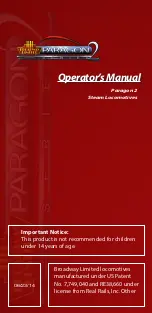
micro
EC 135
indoor
8
Since the two rotors are driven by two motors separately, you can cause different torques of the
two rotors ( maintaining constant overall thrust) by increasing the speed of one motor and de-
creasing the speed of the other to turn the helicopter left or right around the vertical (yaw) axis.
This is used instead of the tail rotor control in conventional helicopters to turn around in hovering
or change direction in flight.
The speed of the motors are controlled by the throttle stick as well as the yaw stick on the
transmitter. When you push forward the throttle stick towards full power position, the speed of
both upper and lower motor increases. Hence the speed of both upper and lower rotor blades
increase. However, when you push the rudder stick to the left or to the right, the speed of one
motor increases and the speed of the other motor decreases. Hence the speed as well as the
torque of one rotor increases and the torque of the other rotor decreases. Therefore the heli-
copter will be turned to the left or to the right.
Just like helicopters with a single main rotor and a tail rotor, the pitch stick controls the helicopter
to fly forwards or backwards, and the roll stick is used to roll the helicopter to the left or to the
right.
This is carried out by the servos linked to the swashplate which in turn tilts the lower rotor disc
so as to make the helicopter fly forwards or backwards, to the left or to the right.
The control box
The so-called
control box
is located between the receiver and the servos / motors and contains
gyro, mixer and 2 ESCs built in one box. It is factory-installed and upper motor, lower motor,
battery pack and two servos are connected to it. Fig.(3) below shows the connections.
The
Gain
trimmer (yaw trim) and the
Proportional
Trimmer (gyro gain) are preset in the factory.
Fig. (3): Connection of the control box
1. Yaw Trim 2. Gyro Gain 3. Monitor LED 4. Upper motor socket
5. Lower motor socket 6. Battery plug 7. Pitch servo 8. Roll servo
















































